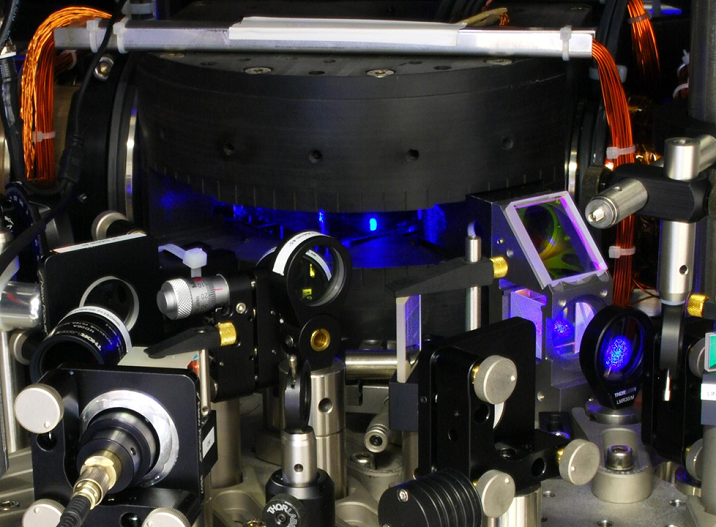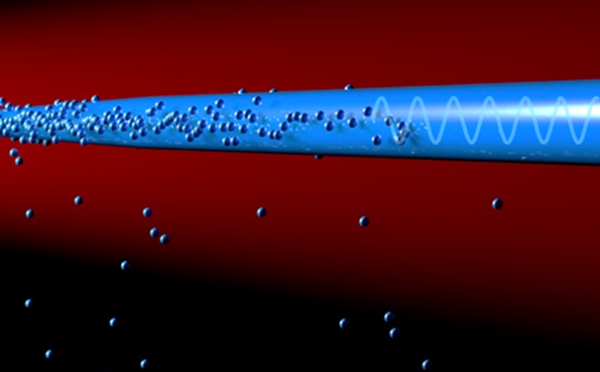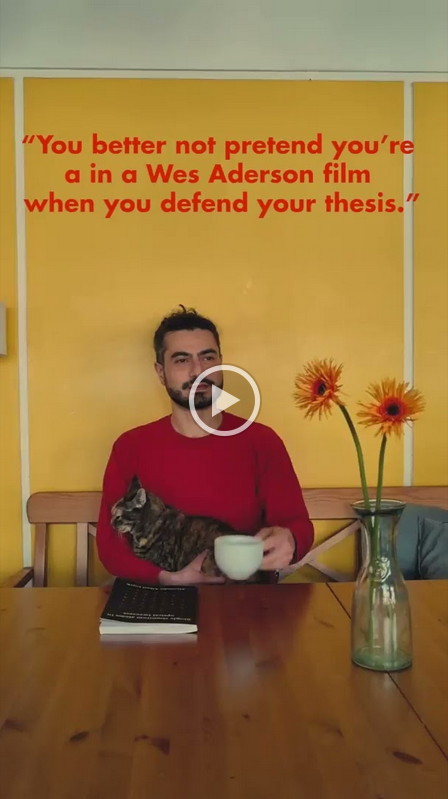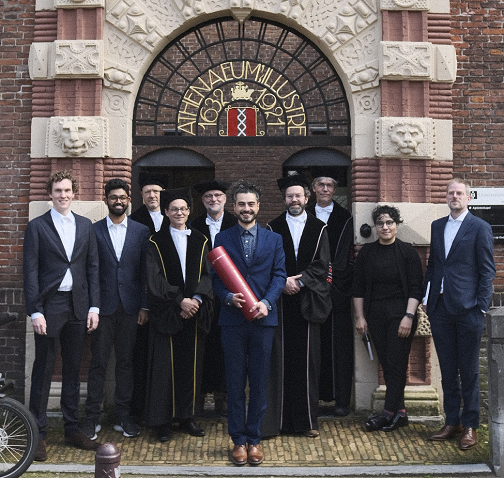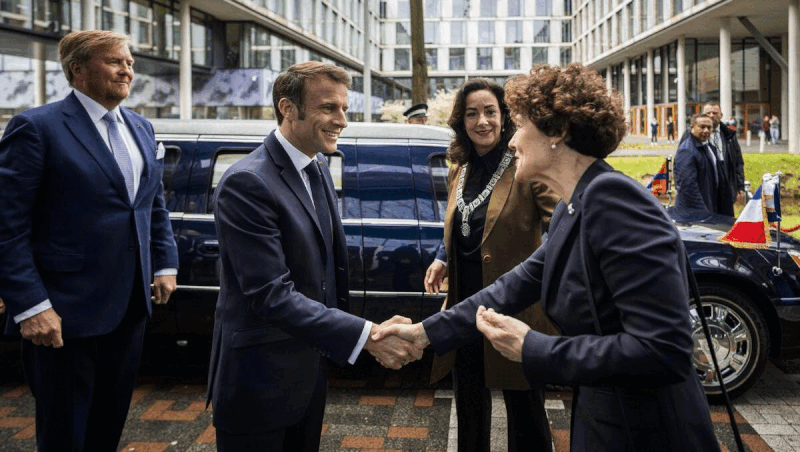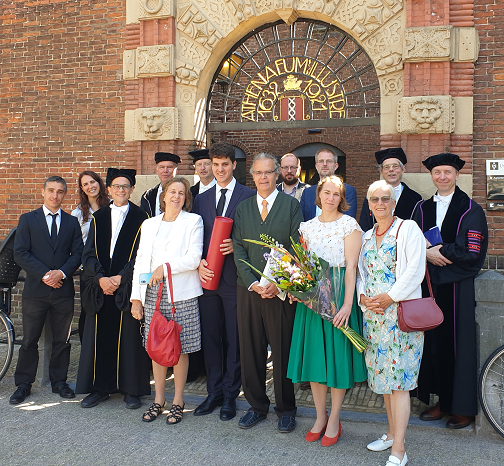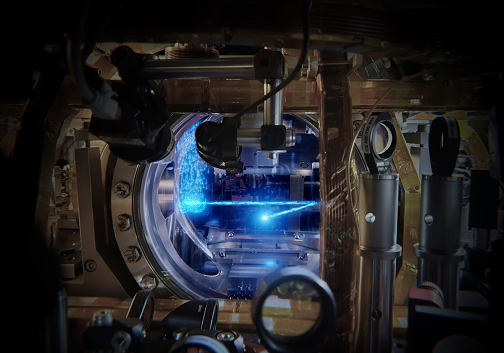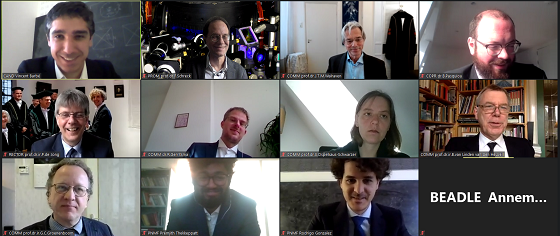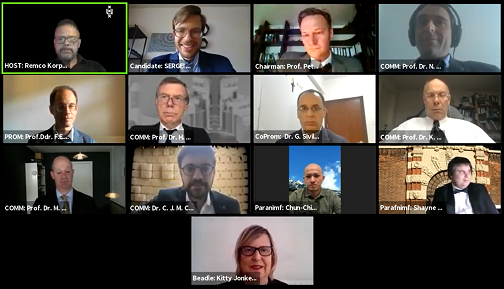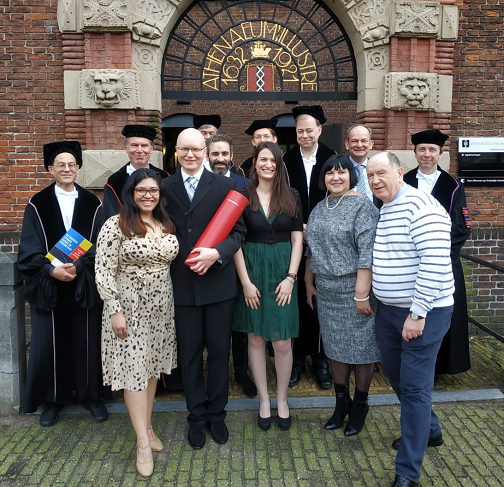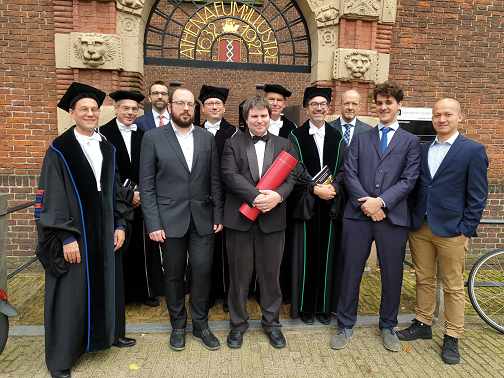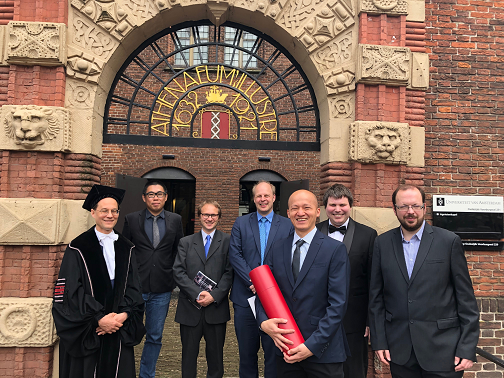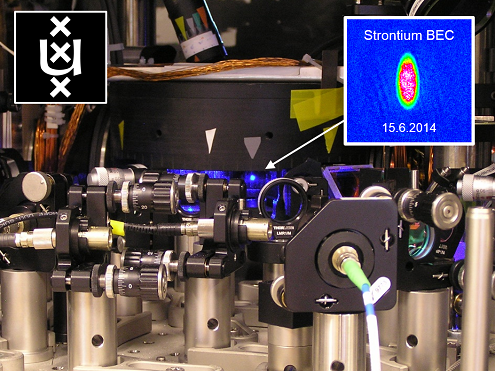Strontium quantum gas projects
Ultracold quantum gases allow us to explore quantum mechanics and are at the core of extremely sensitive measurement devices. To date, thirteen elements have been cooled to quantum degeneracy. Each of them has different properties that make them useful for different explorations and applications. We are studying quantum gases of strontium, an alkaline-earth element that provides us with long-lived optically excited states, ultra-narrow optical transitions and a large nuclear spin. These properties make Sr uniquely suited for exciting research projects, as you ll see when following the links below.
Open positionsOur partners at VU and TU/e and we do have several master, PhD, postdoc and research assistant positions on exciting and unique experiments. For example we offer a master and a PhD position on building a superradiant clock and a PhD and postdoc position on strongly interacting Rb-Sr mixtures and RbSr molecules and PhD and postdoc positions on quantum simulation and computing with arrays of single Sr atoms coupled through Rydberg interactions. We can open positions on our other research lines in dependence of the qualification of applicants. If you are interested in PhD or postdoc positions on any of our research lines, please contact Florian Schreck. A master degree or equivalent (3-4 study years + research project in experimental AMO group, ideally with ultracold atoms or trapped ions) is required to start a PhD with us. In case you do not quite fullfill these requirements, but have studied physics for at least three years, you might be interested in pursuing a master degree at UvA. Our institute financially supports a few non-Dutch students each year to study here. Master projects and internshipsWe offer master projects and internship projects. Example projects are described here. Contact us for the up-to-date list of projects. From time to time we also offer small paid jobs in our labs (which cannot be used to collect ECTS points). Please contact Florian Schreck for information.
|
Public lab tours
Are you interested in seeing our labs for yourself? Then assemble a group of 10 people or more and we'll arrange a tour for you. If needed the tour can also take place over Zoom. This offer is in particular addressed to high school students. Please contact Florian Schreck for information.
News
Welcome to András Gácsbaranyi!
András joined the QDNL team to build our zero-deadtime strontium optical clock.
Congratulations to Alex Urech for his PhD!
Alex obtained a PhD for his thesis Single strontium atoms in optical tweezers.
Alex with his defense committee and paranymphs.
President and king
It was a great honor to show French president Macron and King Willem-Alexander of The Netherlands our labs!
Here our news item and photos.
Welcome to Ananya Sitaram!
Ananya joined our group as postdoc to work on continuously operating strontium optical clocks.
Applications open for Ultracold Quantum Sensing Workshop at Lorentz Centre
We are organizing a Lorentz Center Workshop on Ultracold Quantum Sensing, April 17 - 21, in Leiden, Netherlands. Applications are open till February 5 under this link.
Mehrdad explains his Red Pitaya laser locking system (YouTube, github)
Mehrdad has programmed a nice laser locking system using a Red Pitaya. He explains it on his YouTube channel and has placed all sources on github.
Quantum Flagship project AQuRA has started
The AQuRA consortium will build an optical atomic clock with high technology readiness level (TRL 7). We are coordinating this project and will contribute robust optical circuits to the clock. More details are in an IoP news item and on the AQuRA website.
Quantum Flagship project EuRyQa has started
The EuRyQa consortium will build a European infrastructure for Rydberg Quantum Computing. The QDNL KAT-1 Rydberg Quantum Computing team (Servaas Kokkelman's group at TU/e and our group) are participating with our Sr tweezer quantum simulators/computers. More details are on the EuRyQa website.
Welcome to Digvijay!
Digvijay joined the RbSr team to work on quantum chemistry and quantum simulation with RbSr molecules.
Welcome to Simon Lepleux and Noé Grenier!
Simon and Noe joined us for 1-year projects. Simon is working on RbSr and Noé on our atom laser experiment.
Welcome to Philippe Bouyer!
Philippe has started as coordinator of the Quantum Sensing catalysis program of Quantum Delta NL. In addition he joined our QG&QI group and the AMO group at TU/e.
Welcome to Yu Chih Tseng!
Yu Chih joined the SrMic team to work on quantum simulation and computing with single, tweezer trapped Sr atoms, coupled by Rydberg excitations.
Congratulations to Rodrigo Gonz lez Escudero for his PhD!
Rodrigo obtained a PhD for his thesis Quantum gases are forever: Achieving continuous Bose-Einstein condensation.
Rodrigo with his defense committee, friends and family.
Continuous Bose-Einstein condensation
Our work on continuous Bose-Einstein condensation was published in Nature, together with a Research Briefing. We also wrote a general public news item.
Atoms are continuously flowing through a sequence of laser cooling stages till they are accumulated in a crossed dipole trap and form a Bose-Einstein condensate that lives indefinitely.
Mini-MOT for teaching
Floris Keizer and Patrick Dooyeweerd are teachers who did an internship with us. They constructed a miniature magneto-optical trap apparatus guided by Benjamin Pasquiou and talk about their work in this video.
Welcome to Sumit Sarkar and Benedikt Heizenreder!
Sumit has joined the QDNL team as a postdoc. We will build an optical lattice clock and make it useful for research and industry. Benedikt has joined the superradiant clock team and is a member of our MoSaiQC Innovative Tranining Network.
Nature Physics Insight "Laser cooling for quantum gases" review published
Our invited review article on "Laser cooling for quantum gases" is now published in Nature Physics. Here an openly accessible version. We also wrote a short IoP news item about it.
Welcome to Junyu He!
Junyu has joined the SrPAL team as a postdoc. We have the goal of outcoupling a continuous atom laser from our continuous-wave BEC.
Quantum Delta NL funded
Quantum Delta NL received 615 million to boost quantum technology in the Netherlands. We are proud to be part of it with our quantum sensing and quantum simulation/computation research.
Quantum Science Seminar talk
Florian was invited to give a talk about our continuous-wave BECs and our superradiant clock project in the Quantum Science Seminar (YouTube, pdf, pptx). During this talk Rodrigo gave a short tour of the atom laser lab (YouTube) and Francesca showed the iqClock lab (YouTube). On other occasions Alex Urech showed the Sr tweezer machine (YouTube) and Vincent Barbé the RbSr lab (YouTube).
Congratulations to Vincent Barbé for his PhD!
Vincent obtained a PhD for his thesis Ultracold RbSr: Optical and magnetic spectroscopy, Feshbach resonances and molecular structure. He surprised us with this video lab tour during the defense, replacing the usual slide show to family and friends (French with English subtitles):
Afterwards Vincent defended his thesis before the doctorate committee.
Welcome to Stefan Alaric Sch ffer, Mikkel Tang and Camila Beli Silva!
The iqClock team welcomes three new team members. Stefan did win a postdoc grant to join us, Mikkel is on secondement from the Niels Bohr Institute's quantum metrology group for six months, and Camila started her PhD, funded by MoSaiQC.
Welcome to Ivo Knottnerus and Mateusz Borkowski!
Ivo has joined the SrMic team to develop a quantum simulator/computer based on Rydberg coupled Sr atoms in optical tweezers and Mateusz has joined the RbSr team as a guest researcher.
Studiotopia - A collaboration between art and science
We are collaborating with artists Dmitry Gelfand and Evelina Domnitch on a Studiotopia project, see IoP news item.
Congratulations to Sergei Piatchenkov for his PhD!
Sergei obtained a PhD for his thesis A versatile ultracold strontium apparatus: from construction to new tools for quantum simulation.
Sergei enthusiastically defending his thesis before the doctorate committee.
Congratulations to Oleksiy Onishchenko for his PhD!
Oleksiy obtained a PhD for his thesis Ultracold atomic gases of strontium: production and narrow-line spectroscopy (high-res version).
Happy Oleksiy with his friends, parents, and doctorate committee.
Congratulations to Shayne Bennetts for his PhD!
Shayne obtained a PhD for his thesis 1000 times closer to a continuous atom laser: Steady-state strontium with unity phase-space density (high-res version).
Elegant Shayne with his paranymphs and doctorate committee.
Innovative Training Network MoSaiQC funded by European Commission
The European Innovative Training Network MoSaiQC has 15 open PhD positions for work on optical clocks.
Press release: EC funds Innovative Training Network for quantum clocks.
Welcome to Premjith Thekkeppat, Francesca Famà and Sheng Zhou!
Prem will do his PhD on the RbSr project and Francesca and Sheng will do their PhDs on the iqClock project.
Congratulations to Chun-Chia Chen for his PhD!
Chun-Chia obtained a PhD for his thesis An atomic marble run to unity phase-space density.
Proud and happy Chun-Chia with his paranymphs and members of the doctorate committee.
RbSr project funded by NWO Programme
We coordinate the NWO programme Atomic Quantum Simulators 2.0 - Taming Long-range Interactions, which will create and study long-range interacting many-body systems based on RbSr ground-state molecules or ytterbium ions immersed in ultracold lithium gas. Partners in this programme are Rene Gerritsma, Gerrit Groenenboom, Servaas Kokkelmans and Cristiane Morais Smith.
iqClock consortium funded by European Union
We coordinate the Quantum Flagship consortium iqClock, which will build an integrated optical lattice clock and develop superradiant clocks. On this occasion Folia produced a viedo explaining optical clocks, Ad.nl presented a viedo lab tour, and De Volkskrant printed an interview.
Congratulations to Alessio Ciamei for his PhD!
Alessio obtained the distinction cum laude for his PhD thesis Taming ultracold RbSr and Sr2.
Observation of Feshbach resonances between alkali and closed-shell atoms
Nature Physics 14, 881 (2018), open-access, view-only version: SharedIt, arXiv:1710.03093.
Nature Physics news & views: Quo vadis now, cold molecules?
Press release: Quantum LEGO: building ultracold molecules.
Steady-State Magneto-Optical Trap with 100-Fold Improved Phase-Space Density
Phys. Rev. Lett. 119, 223202 (2017), arXiv:1707.05370.
Press release: Towards a continuous atom laser
Lecturer in the spotlight
UvA News: Lecturer in the spotlight: Florian Schreck
Editor's Suggestion
Our article Efficient production of long-lived ultracold Sr2 molecules was highlighted by Phys. Rev. A as "Editor's Suggestion".
NWO Zwaartekracht grant for Quantum Software Consortium
As part of QuSoft, we are members of the Quantum Software Consortium, which received an NWO Zwaartekracht grant.
Congratulations to Alex Bayerle for his PhD!
Alex obtained his PhD for the thesis Ultracold strontium and rubidium: mixtures, quantum gases and molecules.
NWO Vici grant
Florian Schreck received an NWO Vici grant to construct a perpetual atom laser and to use that laser for the creation of an active clock laser.
Marie Curie grant
Georgios Siviloglou received a Marie Curie grant of the European Comission (SYMULGAS, No. 661171) to implement artificial gauge fields with strontium.
NWO Veni grant
Benjamin Pasquiou received an NWO Veni grant to demonstrate atom interferometry using a perpetual atom laser.
Inauguration of our labs
UvA rector magnificus prof. Dymph van den Boom visited us and inaugurated our new labs.
Sr BEC at the University of Amsterdam
Our machine is working again: we have created the first Sr BECs at UvA!
Physics World Top Ten Breakthroughs 2013
Our work on laser cooling to quantum degeneracy has been selected as one of the Top Ten Breakthroughs in Physics 2013 by Physics World, the journal of the British Institute of Physics. See also IQOQI press release and UvA press release.
ERC consolidator grant
Florian Schreck received an ERC consolidator grant.
IQOQI dissertation prize for Simon Stellmer
Simon Stellmer has received an IQOQI dissertation prize for his work in our group.
Moving to Amsterdam!
Our group has arrived at the University of Amsterdam. And even our super fragile glass vacuum cell survived the transport despite -6°C outside temperature in Innsbruck and a huge storm in Amsterdam!
Former research projects
SrBEC: first strontium BECs
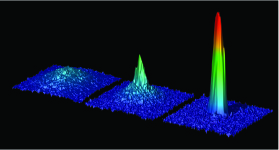
Funding
The project is hosted by the University of Amsterdam at the Institute of Physics. Funding is provided by an ERC consolidator grant (QuantStro, No. 615117), an NWO Vici grant (No. 680-47-619), an NWO Zwaartekracht grant (Quantum Software Consortium), an NWO Veni grant (No. 680-47-438), and a Marie Curie grant of the European Comission (SYMULGAS, No. 661171). Formerly the project was hosted by the Austrian Academy of Sciences at the Institute for Quantum Optics and Quantum Information. Funding was provided by a START prize of the FWF and the BMWF and the iSense FET-Open grant of the European Commission.
